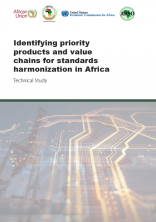Identifying priority products and value chains for standards harmonization in Africa

The Agreement Establishing the African Continental Free Trade Area entered into force on 30 May 2019. The operational phase of the Agreement was launched on 7 July 2019 and tariff dismantlement will begin on 1 July 2020. To date, 54 member States of the African Union have signed the Agreement and 30 of these have deposited official instruments of ratification.
The Agreement has the potential to be a game changer for the industrialization of Africa. Through progressively eliminating tariffs and removing non-tariff barriers on intra-African trade and addressing services-related bottlenecks, the Free Trade Area can address the fragmentation of African economies. This will support the creation of a business environment conducive to value addition and the promotion of intra-African trade, in particular in industrial goods. In the light of these benefits, at the outset of negotiations, African policymakers designated industrialization as the central pillar of the African Continental Free Trade Area.
The industrialization and trade potential of the African Continental Free Trade Area, however, cannot be realized without adequate quality infrastructure systems, including metrology, standardization, accreditation, quality management and conformity assessment. Compliance with standards and technical regulations is important for signalling and guaranteeing the quality of produced and traded goods.